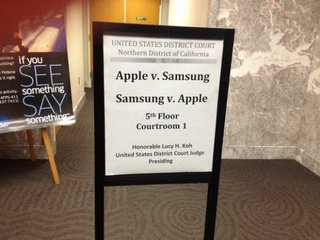Oxford Cancer Analytics raises $11M to detect lung cancer via a blood test
OXcan combines proteomics and artificial intelligence for early detection
Read more...
You may not be aware, but Apple has been doing very well lately. Just last week, it broke the record for the highest market cap in U.S. history at $623.5 billion, making it the most valuable U.S. company ever. Then, of course, Apple scored a game-changing victory on Friday when a California court ordered Samsung to pay Apple $1.05 billion for infringing on its patents. Apple can just tuck that away with the $163 billion it currently has stuffed in the mattress.
Today, Apple broke a new record when shares hit a high of $680 a piece, jacking the market cap up to a dizzying $638 billion and making Apple the most valuable company in U.S. history…again. At the time of this writing, shares had drifted down to $675 a share for a market cap of $633 billion.
Interestingly, Apple’s win in court has translated into a slump in Google shares and a boost for virtually every other phone maker—Microsoft, Nokia, even RIM! While Google shares fell 1% to $671 from its Friday close of $678, Microsoft shares were up .69%, Nokia was up 7.31%, and RIM was up 1.89%.
It would appear that shareholders are anticipating a major dip in sales of Android devices since Samsung was the foremost manufacturer of Android phones. But there’s a darker cloud lurking on the horizon: now that Apple effectively owns the rights to “rectangles with curved edges,” as Samsung put it (or we could get more detailed and say Apple owns the rights to double-tap zooming, bounce-back scrolling, and pinch-to-zoom), it could, in theory, pursue lawsuits against Google itself, if it wanted to.
So not only are Samsung-manufactured Android devices facing a total design overhaul, but Google may find itself in a weak position should Apple decide to take it to court—all of which spells trouble for the future of Android. A big chunk of the problem comes down to the jury’s ruling that Apple did not infringe on standard-essential wireless technology patents. Ultimately, it means that standard-essential patents simply don’t carry as much weight in court as everyone thought they did. Now, remember Google’s $12.5 billion Motorola acquisition? The whole point was to buy Motorola’s wireless patents so that it could hold its own against Microsoft and Apple. Now it may have been all for naught.
But this is Google. What’s $12 billion down the drain? This certainly doesn’t mean Android is circling the drain as we speak. The silver lining in all of this, of course, is that it means we’re going to see a lot of innovation in the smartphone world. Hardware manufacturers and OS makers aren’t going to take any chances with Apple, so smartphone makers are going to have to get their thinking caps on and get creative.
Google could not be reached for comment.
Image source: perezsolomon.com
OXcan combines proteomics and artificial intelligence for early detection
Read more...Nearly $265B in claims are denied every year because of the way they're coded
Read more...Most expect to see revenue rise, while also embracing technologies like generative AI
Read more...

